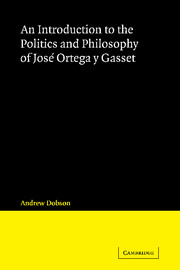Book contents
10 - Razón vital – reason from the point of view of life
Published online by Cambridge University Press: 05 March 2012
Summary
In chapter 8, Ortega's notion of individual human life as radical reality was established. Strictly speaking, what there fundamentally is in the world is subject and object engaged in a continual relationship defined by interdependence rather than independence. This perspective has considerable repercussions in terms of a discussion of the nature of those objects which we normally describe as ‘things’. Of course, to put the point that way is already, on Ortega's terms, to be indulging in theory rather than pure description because ‘things’ in their radical reality cannot be discussed apart from the subject for whom they exist. Ortega does indeed discuss them in this way, but he would claim that his treatment is not innocent or gullible in that he attempts to describe what things are while always bearing in mind that they are ‘nothing’ without the subject for whom they ‘are’. In other words, although we need to ‘remove’ the object from its relationship with the subject in order to discuss it, the subsequent discussion will always take place in view of the fact that a definitive feature of the object is, precisely, its relationship with and towards a subject. This is, so to speak, a practical exercise in Ortega's technique of ‘un-thinking’, and what is principally to be ‘un-thought’ in this case is the notion of the independence of subject and object. An object fundamentally and radically is what it is when it is part of the executive act which Ortega considers to be the stuff of radical reality.
- Type
- Chapter
- Information
- Publisher: Cambridge University PressPrint publication year: 1989



